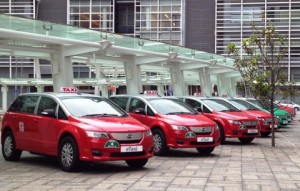EVs: Geely Revs Up, BYD Enters HK

After making increasing noises about its intent to develop electric vehicles (EVs), domestic automaker Geely (HKEx: 175) is getting serious about the effort by moving one of its top executives into a new role overseeing its EV sales. Meantime, rival EV maker BYD (HKEx: 1211; Shenzhen: 002594) has gotten its own new boost in the space with the launch of a new pilot program for its electric taxis in Hong Kong. Both developments are certainly positive for the sector, and indicate the Chinese automakers haven’t given up on their dreams of bringing EVs to both China and the world.I’m no expert on EVs, but based on what I’ve seen and heard the current technology still isn’t quite ready for true commercialization and will require another generation or two of new technologies before it’s ready for true mass market sales. But that said, perhaps BYD and now Geely are positioning themselves to become leaders in the space if and when that happens, alongside most major western players that have been in the market for more than a decade.
Let’s start with a look at the latest news from Geely, which has announced that Liu Jinliang has left his older role as head of the company’s car sales to focus exclusively on developing its EV business. (company announcement) In a bid to ease concerns that the move might represent a demotion, Geely is quick to add that Liu will retain his role as a company executive director.
I’m no expert on the inside workings of Geely, but recent signs do appear to indicate this move really does represent what Geely says, namely an effort to seriously develop its EV business. The company’s sales have been weak in the last few years as it lost share to more aggressive foreign players. But it’s done relatively well so far this year, with sales up 21 percent in the first 4 months of 2013 as it works to revive its traditional car business. At its annual meeting last week in Hong Kong, Geely also said it expects sales growth to accelerate in the second half of the year as it introduces new models. (English article) That certainly doesn’t sound like the kind of performance that would merit a demotion for Liu.
Geely is also planning to roll out an electric vehicle model in the second half of the year, the EC7, hinting that Liu’s move might be related to a major push for the car. This latest move would come just 3 months after Geely announced a new joint venture to produce electric cars with Kandi Technologies (Nasdaq: KNDI), again emphasizing the company’s intent to make a serious bid into the EV space.
From Geely, let’s take a quick look at BYD, the Warren Buffett-invested company that has just announced the latest in a series of pilot programs aimed at selling its electric taxis and buses to fleet owners outside of China. The company has already launched trial programs in Europe and the US and its hometown of Shenzhen, and now has just begun another program in Hong Kong. (company announcement) This latest deal will see 45 of BYD’s electric taxis rolled out initially in the former British territory, and includes a program to build up the necessary charging infrastructure.
As a former Hong Kong resident, I have to say this latest deal looks quite encouraging to me due to the territory’s heavy reliance on taxis as part of its public transportation infrastructure. This pilot program could easily become a major selling point for BYD’s EVs if the taxis perform well on Hong Kong’s crowded roads. But BYD could also suffer a major blow if there are lots of problems, which is always a possibility with this kind of new technology. All that said, this latest move for BYD certainly looks positive for the company — if it can survive long enough to see some of its EV pilot programs finally bear fruit with major fleet and eventually consumer sales.
Bottom line: New moves by Geely and BYD indicate the EV space is gaining momentum among China’s domestic automakers, providing a psychological boost for the sector.
Related postings:
This article was first published in the online edition of the South China Morning Post at www.scmp.com.
